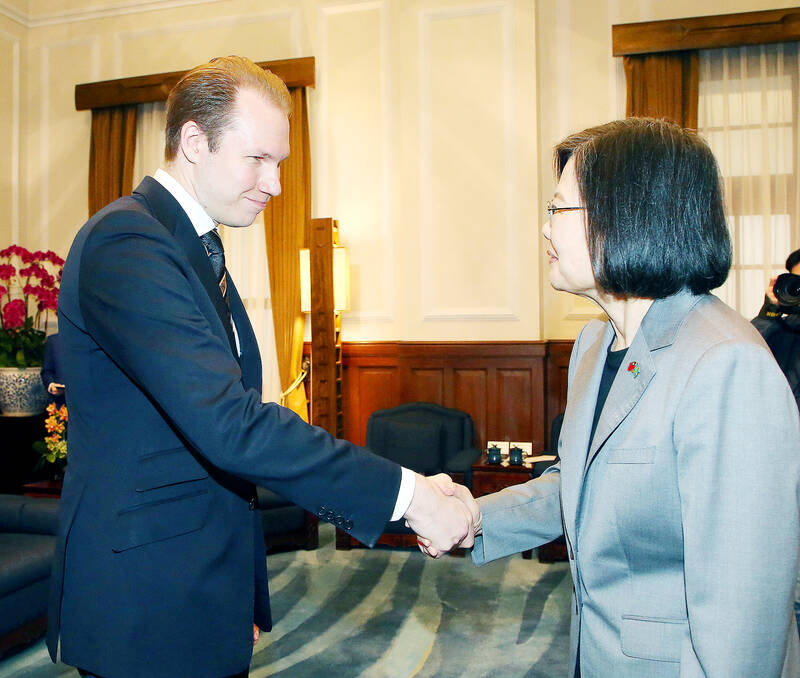Taiwan’s exclusion from the World Health Assembly (WHA) and other international organizations is “unacceptable,” visiting Swedish lawmaker Markus Wiechel said during a meeting with President Tsai Ing-wen (蔡英文) yesterday.
Wiechel is leading a delegation of Swedish lawmakers — Sara Gille, Nima Gholam Ali Pour and Rasmus Giertz — to Taiwan on a six-day visit that ends today.
While most of the free world considers Taiwan “a significant international player in trade and democracy,” the nation is excluded from many important international organizations, he said.

Photo: CNA
“This is completely unacceptable,” he added.
He and his colleagues have voiced support for Taiwan’s inclusion in the WHA, the International Criminal Police Organization and the International Civil Aviation Organization at several international occasions, and would continue to do so, Wiechel said.
He echoed visiting former British prime minister Liz Truss’ remark that Taiwan is a beacon of democracy in the Indo-Pacific region, saying: “I couldn’t agree more.”
Despite Taiwan being a relatively young democracy, it is “one of the strongest, most stable and well-functioning democracies in the world,” he said, calling it an “impressive achievement” that Taiwanese should be proud of.
It is crucial for like-minded democracies to work together, especially when totalitarian forces are growing stronger and more hostile, which is why the delegation decided to visit Taiwan, Wiechel said.
Taiwan and Sweden can benefit from deeper cooperation in fields based on the values the two sides share, including peace, freedom, democracy, universal human rights and the rule of law, he said.
The delegation learned about Taiwan’s efficient healthcare system, its impressive education system and much more during the trip, he added.
“It’s obviously not just a coincidence that Taiwan is a world-leading country in technological innovation and many other fields,” Wiechel said.
“We must increase our bilateral cooperation,” as what the delegation had learned during the past few days made him more certain that Sweden has a lot to learn about Taiwan, he said.
Tsai thanked Sweden for its support for Taiwan, including passing a resolution to support closer ties with the nation in April last year, when a delegation of Swedish lawmakers visited Taiwan, despite Chinese opposition.
Bilateral trade between Taiwan and Sweden exceeded US$1.7 billion last year, an increase of 12 percent from the previous year, she said.
The countries have been seeking more opportunities to cooperate in fields such as climate change and supply chain security, she added.
Tsai called on the delegation to support a bilateral investment agreement between Taiwan and the EU to boost cooperation, as well as the confidence of businesses from both sides in investing in the other.
Taiwan is a force for good in international society, and is a capable and trustworthy partner that can help with pandemic prevention, disaster relief and supply chain security, she said.

MAKING WAVES: China’s maritime militia could become a nontraditional threat in war, clogging up shipping lanes to prevent US or Japanese intervention, a report said About 1,900 Chinese ships flying flags of convenience and fishing vessels that participated in China’s military exercises around Taiwan last month and in January last year have been listed for monitoring, Coast Guard Administration (CGA) Deputy Director-General Hsieh Ching-chin (謝慶欽) said yesterday. Following amendments to the Commercial Port Act (商港法) and the Law of Ships (船舶法) last month, the CGA can designate possible berthing areas or deny ports of call for vessels suspected of loitering around areas where undersea cables can be accessed, Oceans Affairs Council Minister Kuan Bi-ling (管碧玲) said. The list of suspected ships, originally 300, had risen to about

DAREDEVIL: Honnold said it had always been a dream of his to climb Taipei 101, while a Netflix producer said the skyscraper was ‘a real icon of this country’ US climber Alex Honnold yesterday took on Taiwan’s tallest building, becoming the first person to scale Taipei 101 without a rope, harness or safety net. Hundreds of spectators gathered at the base of the 101-story skyscraper to watch Honnold, 40, embark on his daredevil feat, which was also broadcast live on Netflix. Dressed in a red T-shirt and yellow custom-made climbing shoes, Honnold swiftly moved up the southeast face of the glass and steel building. At one point, he stepped onto a platform midway up to wave down at fans and onlookers who were taking photos. People watching from inside

Japan’s strategic alliance with the US would collapse if Tokyo were to turn away from a conflict in Taiwan, Japanese Prime Minister Sanae Takaichi said yesterday, but distanced herself from previous comments that suggested a possible military response in such an event. Takaichi expressed her latest views on a nationally broadcast TV program late on Monday, where an opposition party leader criticized her for igniting tensions with China with the earlier remarks. Ties between Japan and China have sunk to the worst level in years after Takaichi said in November that a hypothetical Chinese attack on Taiwan could bring about a Japanese

STREAMLINED: The dedicated funding would allow the US to transfer equipment to Taiwan when needed and order upgraded replacements for stockpiles, a source said The US House of Representatives on Thursday passed a defense appropriations bill totaling US$838.7 billion, of which US$1 billion is to be allocated to reinforcing security cooperation with Taiwan and US$150 million to replace defense articles provided to the nation. These are part of the Consolidated Appropriation Act, which the US House yesterday passed with 341 votes in favor and 88 against. The act must be passed by the US Senate before Friday next week to avoid another government shutdown. The US House Committee on Appropriations on Monday unveiled the act, saying that it allocates US$1 billion for the Taiwan Security Cooperation Initiative